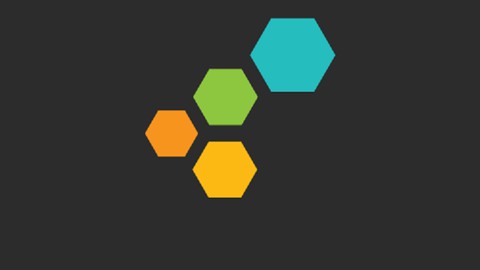
Intro to JavaScript APIs
Intro to JavaScript APIs, available at $49.99, has an average rating of 4.2, with 53 lectures, based on 23 reviews, and has 240 subscribers.
You will learn about Use REST APIs with JavaScript Retrieving and Modifying Data with REST APIs Working with Databases Uploading Files with REST APIs Securing REST APIs with JSON Web Tokens Caching REST API Data with Local Storage This course is ideal for individuals who are Intermediate web developers who are interested in back-end development and APIs It is particularly useful for Intermediate web developers who are interested in back-end development and APIs.
Enroll now: Intro to JavaScript APIs
Summary
Title: Intro to JavaScript APIs
Price: $49.99
Average Rating: 4.2
Number of Lectures: 53
Number of Published Lectures: 53
Number of Curriculum Items: 58
Number of Published Curriculum Objects: 58
Original Price: $19.99
Quality Status: approved
Status: Live
What You Will Learn
- Use REST APIs with JavaScript
- Retrieving and Modifying Data with REST APIs
- Working with Databases
- Uploading Files with REST APIs
- Securing REST APIs with JSON Web Tokens
- Caching REST API Data with Local Storage
Who Should Attend
- Intermediate web developers who are interested in back-end development and APIs
Target Audiences
- Intermediate web developers who are interested in back-end development and APIs
This course will teach you how to write, use, and consume REST APIs in JavaScript.
Application Programming Interfaces (APIs) are constructs made available in programming languages to allow developers to create complex functionality more easily. They abstract more complex code away from you, providing some easier syntax to use in its place.
Client-side JavaScript, in particular, has many APIs available to it — these are not part of the JavaScript language itself, rather they are built on top of the core JavaScript language, providing you with extra superpowers to use in your JavaScript code. While there are many APIs available in JavaScript we often have to write our own custom API to allow transitions and access to data in our application.
A REST API is a way of easily accessing web services. When a RESTful API is called, the server will transfer to the client a representation of the state of the requested resource. A RESTful API is stateless, separates concerns between client-server, allows caching of data client-side and it utilizes standardized base URLs and methods to perform the actions required to manipulate, add, or delete data.
Each section is designed to be completed in one day, along with a hands-on practice activity to be completed before moving on to the next module.
This course assumes the following as prerequisite knowledge:
-
Intermediate to Advanced JavaScript
-
Use of the Browser DOM
-
Use of database CRUD transactions
-
Basics of Node.js
Course Curriculum
Chapter 1: Development Environment / Tool Setup
Lecture 1: Setting up your environment
Lecture 2: Getting Started with our Tools
Lecture 3: Create and Test the Express Server
Chapter 2: Use REST APIs with JavaScript, introduction, and course overview
Lecture 1: Using REST in applications
Lecture 2: Communication with Response Codes
Lecture 3: Communicating with Requests
Lecture 4: Using JavaScript with REST
Lecture 5: JavaScript Sample Client Request
Lecture 6: Getting Started with Express
Chapter 3: Retrieving and Modifying Data with REST APIs
Lecture 1: Retrieving Data using a REST API
Lecture 2: Using JSON Envelopes to Return Data
Lecture 3: Creating a Module
Lecture 4: Reading Response Data From a File
Lecture 5: Searching for Data
Lecture 6: Searching for Data Part 2
Lecture 7: What is CRUD?
Lecture 8: Creating a POST Endpoint
Lecture 9: Creating a PUT Endpoint
Lecture 10: Creating a DELETE Endpoint
Lecture 11: Call a REST API Method from an HTML page
Lecture 12: Working with CORS
Lecture 13: Creating an HTML Page to Call the REST API
Chapter 4: Working with Databases
Lecture 1: Using Databases with an API
Lecture 2: Installing MongoDB
Lecture 3: Getting Connected
Lecture 4: Installing Mongoose
Lecture 5: Creating a Schema
Lecture 6: CRUD Operations in Mongoose – Adding Data
Lecture 7: CRUD Operations in Mongoose – Querying
Lecture 8: CRUD Operations in Mongoose – Updating
Lecture 9: CRUD Operations in Mongoose – Deleting
Chapter 5: Uploading files with a JavaScript REST API
Lecture 1: Receiving Files in Express
Lecture 2: Uploading using HTML Forms Synchronously
Lecture 3: Uploading using HTML Forms Asynchronously
Lecture 4: Uploading Multiple Files Synchronously
Lecture 5: Uploading Multiple Files with HTMLHttpRequests
Lecture 6: Managing Files
Lecture 7: Overview of Express File Sending Methods
Chapter 6: Securing REST APIs with JSON Web Tokens
Lecture 1: Introduction to JSON Web Tokens
Lecture 2: Setup the Membership Project
Lecture 3: The Flow of Authentication
Lecture 4: JSON Web Token Registration Request
Lecture 5: Creating a login request
Lecture 6: Permission Middleware
Chapter 7: Caching REST API Data with Local Storage
Lecture 1: Introduction to Local Storage
Lecture 2: Understanding Use Cases
Lecture 3: Getting Started with the Project
Lecture 4: Using API Data Storage – The Storage API
Lecture 5: Working with LocalStorage
Lecture 6: Storing REST API Data
Lecture 7: Keeping Data Fresh
Lecture 8: Polling an API
Lecture 9: Using a Timestamp for Better API Polling
Instructors
-
Tiffany Ford
Professor and Computer Scientist
Rating Distribution
- 1 stars: 0 votes
- 2 stars: 2 votes
- 3 stars: 3 votes
- 4 stars: 7 votes
- 5 stars: 11 votes
Frequently Asked Questions
How long do I have access to the course materials?
You can view and review the lecture materials indefinitely, like an on-demand channel.
Can I take my courses with me wherever I go?
Definitely! If you have an internet connection, courses on Udemy are available on any device at any time. If you don’t have an internet connection, some instructors also let their students download course lectures. That’s up to the instructor though, so make sure you get on their good side!
You may also like
- Top 10 Mobile App Development Courses to Learn in December 2024
- Top 10 Graphic Design Courses to Learn in December 2024
- Top 10 Videography Courses to Learn in December 2024
- Top 10 Photography Courses to Learn in December 2024
- Top 10 Language Learning Courses to Learn in December 2024
- Top 10 Product Management Courses to Learn in December 2024
- Top 10 Investing Courses to Learn in December 2024
- Top 10 Personal Finance Courses to Learn in December 2024
- Top 10 Health And Wellness Courses to Learn in December 2024
- Top 10 Chatgpt And Ai Tools Courses to Learn in December 2024
- Top 10 Virtual Reality Courses to Learn in December 2024
- Top 10 Augmented Reality Courses to Learn in December 2024
- Top 10 Blockchain Development Courses to Learn in December 2024
- Top 10 Unity Game Development Courses to Learn in December 2024
- Top 10 Artificial Intelligence Courses to Learn in December 2024
- Top 10 Flutter Development Courses to Learn in December 2024
- Top 10 Docker Kubernetes Courses to Learn in December 2024
- Top 10 Business Analytics Courses to Learn in December 2024
- Top 10 Excel Vba Courses to Learn in December 2024
- Top 10 Devops Courses to Learn in December 2024






















